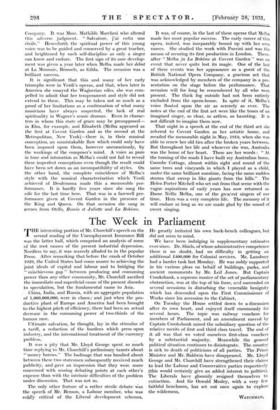The Week in Parliament
THE interesting portion of Mr. Churchill's speech on the second reading of the Unemployment Insurance Bill was the latter half, which comprised an analysis of some of the root causes of the present industrial depression. Needless to say, it was scarcely alluded to in the popular Press. After remarking that before the crash of October 1929, the United States had come nearer to achieving the joint ideals of capital and labour and to bridging the "mischievous gap" between producing and consuming power than any other community, Mr. Churchill ascribed the immediate and superficial cause of the present disorder to speculation, but the fundamental cause to Asia.
. China, India, and Russia, with an aggregate population of 1,000,000,000, were in chaos; and just when the pro- ductive plant of Europe and America had been brought to the highest pitch of efficiency, there had been an actual decrease in the consuming power of two-thirds of the human race.
Ultimate salvation, he thought, lay in the stimulus of a tariff, a reduction of the burdens which press upon industry, and the international treatment of the currency problem.
It was a pity that Mr. Lloyd George spent so much time replying to Mr. Churchill's preliminary taunts about "money barons." The badinage that was bandied about between these two statesmen subsequently received much publicity, and gave an impression that they were more concerned with scoring debating points at each other's expense than with the intrinsic difficulties of the problem under discussion. That was not so.
The only other feature of a rather sterile debate Was the speech of Mr. Benson, a Labour member, who was coldly critical of the Liberal development schemes. He greatly irritated his own back-bench colleagues, but did not seem.to mind.
We have been indulging in supplementary estimates ever since. Dr. Shiels, of whose administrative competence there is no doubt, -had no difficulty in getting an additional £400,000 for Colonial services. Mr. Lansbury had a harder task last Monday. He was nobly supported in his various pleas on behalf of buildings, parks, and ancient monuments by Mr. Leif Jones. But Captain Crookshank, a supreme master of the art of parliamentary obstruction, .was at the top of his form, and succeeded on several occasions in disturbing the venerable benignity • which has descended upon the First Commissioner of Works since his aecession.to, the Cabinet.
On Tuesday the House settled down to a discussion after its own heart, and enjoyed itself enormously for several hours. The topic was railway vouchers for members of Parliament, and an amendment moved by Captain Crookshank raised the subsidiary question of the relative merits of first and third class travel. The end of it all was that we voted ourselves first-class vouchers by a substantial majority, Meanwhile the .general political situation continues to disintegrate. The country is sick to death of politicians of all parties. The .Prime Minister, and Mr. Baldwin have disappeared. Mr. Lloyd George and Mr. Churchill have strengthened their claims to lead the Labour. and Conservative parties respectively (this would certainly give. an added interest to polities). The Liberals have gloomily resigned themselves to extinction. And Sir Oswald Mosley, with a very few faithful henchmen, has set out once again to explore the wilderness.
WATCHMAN.











































 Previous page
Previous page